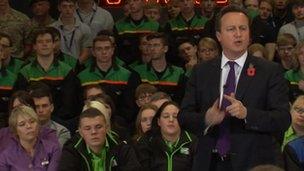Cameron 'frustrated' by dominance of six energy firms
- Published

The prime minister is under pressure to do something about rising energy bills
David Cameron has said he is "frustrated" by the dominance of the so-called 'big six' energy suppliers and called for far greater competition.
The prime minister said he wanted a 'big 60' energy market, with greater choice for consumers and "healthy" competition keeping prices down.
There has been widespread anger at recent price increases of up to 10%.
Ministers are also set to meet firms to discuss claims some direct debit customers have been overpaying.
This followed newspaper reports claiming ministers are concerned that firms are using direct debit customers - many of whose monthly payments are based on estimates of their energy consumption - to stockpile large sums of money.
Ministers are reported to be looking at the interest that firms generate on this money and potentially introducing a new code of conduct for such payments - although no date has been set for a meeting.
'Best answer'
NPpower, British Gas, SSE and Scottish Power have all said they will increase electricity and gas prices by between 8% and 10% while Eon and EDF are expected to follow suit.
The increases will take the cost of an average dual-fuel bill, in most cases, to more than £1,400 a year.
The six firms account for about 90% of the UK energy retail market.
Labour wants a freeze in household bills but the government says this is a gimmick and says it is focused on reviewing competition and looking at a potential reduction in the environmental charges levied on monthly bills.
During a Q&A session with apprentices from a range of firms - held at the Mini plant in Oxford - the prime minister said eight new firms had entered the market since May 2010 but he wanted to see many more.
"Competition is the best answer in all of these areas," he said. "I am frustrated by the 'big six' because I want to see the 'big sixty' and to see many more energy companies."
He rejected suggestions that consumers got a better deal before privatisation, saying a market with a monopoly supplier was inefficient and prices went "shooting up" despite government efforts to intervene.
"You don't get competition through nationalisation," he added. "You get competition through privatisation and proper regulation and making it possible for companies to come into the market. That is what is happening in energy."
Apprenticeships
The government is launching a new review of competition in the market, including an annual audit of suppliers, to see what more can be done to encourage new entrants.
But Labour says the market is inherently dysfunctional and has called for a separation of the firms' generating and retailing capacity as well as a 20-month price freeze from June 2015.
Asked about reports that figures from regulator Ofgem would show wholesale energy prices have risen by less than 2%, a No 10 spokesman said it was for energy companies "to explain decisions on bills to their customers".
Separately, Mr Cameron has announced changes to apprenticeship schemes from the end of 2014, designed to give employers more control over standards and increase the emphasis on numeracy and literacy tests.
He also confirmed that a group of blue chip employers, including BT, Barclays and Tesco, have agreed to offer new 100,000 youth vocational training placements over the next two years.